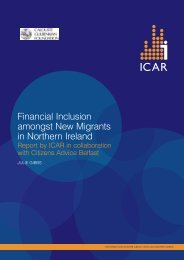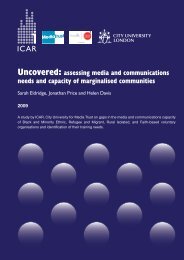The Somali community in the UK: What we know and how we ... - ICAR
The Somali community in the UK: What we know and how we ... - ICAR
The Somali community in the UK: What we know and how we ... - ICAR
Create successful ePaper yourself
Turn your PDF publications into a flip-book with our unique Google optimized e-Paper software.
<strong>in</strong>dustries. But here, too, even given <strong>the</strong> average<br />
lo<strong>we</strong>r educational levels of women, <strong>the</strong>y are often<br />
underemployed. In <strong>the</strong>ir study of t<strong>we</strong>nty <strong>Somali</strong><br />
women <strong>in</strong> Waltham Forest, east London, Sales <strong>and</strong><br />
Gregory (1998) found that only one was<br />
<strong>in</strong> secure employment. O<strong>the</strong>rs had casual work as<br />
<strong>in</strong>terpreters, cleaners, or o<strong>the</strong>r low paid<br />
service workers. None of those with professional<br />
qualifications - <strong>in</strong>clud<strong>in</strong>g teachers, health workers,<br />
a doctor, <strong>and</strong> a chemist - had been able to pursue<br />
<strong>the</strong>ir career <strong>in</strong> <strong>the</strong> <strong>UK</strong>.<br />
<strong>The</strong> loss of self esteem is hard to accept, <strong>and</strong><br />
is echoed by some of <strong>the</strong> 50 women <strong>in</strong> To<strong>we</strong>r<br />
Hamlets, Hackney, <strong>and</strong> Isl<strong>in</strong>gton <strong>in</strong>tervie<strong>we</strong>d by<br />
Emua Ali (2001: 166). Many who had skilled jobs<br />
<strong>in</strong> <strong>Somali</strong>a <strong>we</strong>re h<strong>in</strong>dered by <strong>the</strong> non-recognition<br />
of <strong>the</strong>ir qualifications <strong>and</strong> lack of British work<br />
experience <strong>in</strong> f<strong>in</strong>d<strong>in</strong>g similar employment <strong>in</strong> <strong>the</strong> <strong>UK</strong>.<br />
<strong>The</strong> majority <strong>we</strong>re liv<strong>in</strong>g off benefits, supplemented<br />
by clean<strong>in</strong>g, factory, <strong>and</strong> s<strong>we</strong>atshop work <strong>and</strong> o<strong>the</strong>r<br />
casual unskilled labour (<strong>the</strong> k<strong>in</strong>d of work that most<br />
men refuse to do). For both men <strong>and</strong> women,<br />
even when it seemed that a previous profession<br />
would be a passport to present employment, <strong>the</strong><br />
problem of qualifications ga<strong>in</strong>ed outside <strong>the</strong> <strong>UK</strong><br />
constitutes a serious problem. <strong>The</strong>se are often not<br />
recognised - teachers, doctors, <strong>and</strong> lawyers f<strong>in</strong>d<br />
that <strong>the</strong>y are unable to practise, while courses to<br />
retra<strong>in</strong> or to adapt <strong>the</strong>ir experience to <strong>the</strong> <strong>UK</strong><br />
rema<strong>in</strong> <strong>in</strong>sufficient. Apart from <strong>the</strong> frustration this<br />
causes, <strong>the</strong> British economy <strong>and</strong> public services are<br />
deprived of valuable contributions.<br />
Several of <strong>the</strong> reasons for downgrad<strong>in</strong>g<br />
overlap with those for high <strong>Somali</strong> rates of<br />
unemployment <strong>in</strong> general. Some are attributed to<br />
what is euphemistically called ‘<strong>the</strong> host society’<br />
- <strong>in</strong>stitutional racism <strong>and</strong> discrim<strong>in</strong>ation by<br />
employers. <strong>The</strong>n <strong>the</strong>re are st<strong>and</strong>ard requirements<br />
of employment which may be hard to meet - <strong>the</strong><br />
dem<strong>and</strong> for a National Insurance number, for<br />
example. Young people who have not yet claimed<br />
benefits on <strong>the</strong>ir own behalf, or have not yet held<br />
a job, may not be able to obta<strong>in</strong> this, while papers<br />
such as recommendations by previous employers<br />
may <strong>we</strong>ll have been left beh<strong>in</strong>d when travell<strong>in</strong>g.<br />
O<strong>the</strong>r factors concern <strong>the</strong> refugee <strong>community</strong><br />
itself. One is length of residence; <strong>the</strong> longer <strong>the</strong><br />
residence <strong>in</strong> <strong>the</strong> <strong>UK</strong>, <strong>the</strong> higher <strong>the</strong> likelihood of<br />
be<strong>in</strong>g <strong>in</strong> work. A critical issue here is asylum status.<br />
Legally, those with leave to rema<strong>in</strong> (i.e. refugees<br />
<strong>and</strong> those with exceptional or <strong>in</strong>def<strong>in</strong>ite leave<br />
to rema<strong>in</strong>) have permission to work. S<strong>in</strong>ce July<br />
2002 those await<strong>in</strong>g <strong>the</strong> decision on <strong>the</strong>ir asylum<br />
claim (<strong>in</strong>clud<strong>in</strong>g those on appeal) can no longer<br />
work while <strong>the</strong>y wait <strong>and</strong> may only seek voluntary<br />
work. But for all those without full refugee status,<br />
uncerta<strong>in</strong>ty about <strong>the</strong> future both discourages<br />
employers <strong>and</strong> deters asylum seekers from plann<strong>in</strong>g<br />
a career <strong>in</strong> <strong>the</strong> <strong>UK</strong>.<br />
Ano<strong>the</strong>r critical issue is language. Studies s<strong>how</strong> that<br />
<strong>the</strong> higher <strong>Somali</strong> refugees’ educational level is, <strong>the</strong><br />
better <strong>the</strong>ir comm<strong>and</strong> of English is likely to be, <strong>and</strong><br />
<strong>the</strong> more likely <strong>the</strong>y are to be <strong>in</strong> work (Bloch, 2002;<br />
2003). But, for many, <strong>in</strong>adequate language skills put<br />
<strong>the</strong>m at a disadvantage <strong>in</strong> a competitive job market.<br />
<strong>Somali</strong>s also mention <strong>the</strong>ir lack of references <strong>and</strong><br />
contacts, <strong>and</strong> <strong>the</strong>ir unfamiliarity with <strong>in</strong>terview<br />
techniques <strong>and</strong> <strong>the</strong> whole culture of employment<br />
<strong>in</strong> <strong>the</strong> <strong>UK</strong>.<br />
It also may be that skills acquired at home - such<br />
as herd<strong>in</strong>g or farm<strong>in</strong>g - may not be relevant <strong>in</strong> a<br />
British context. Even commercial experience may<br />
not <strong>we</strong>a<strong>the</strong>r diaspora conditions. Travel <strong>and</strong> trade<br />
have always been part of <strong>Somali</strong> life, <strong>and</strong> <strong>in</strong> <strong>the</strong> <strong>UK</strong><br />
today both men <strong>and</strong> women go on <strong>in</strong>ternational<br />
expeditions to buy gold, cloth, <strong>and</strong> o<strong>the</strong>r items<br />
for resale <strong>in</strong> <strong>the</strong> <strong>Somali</strong> <strong>community</strong>. A US <strong>Somali</strong><br />
economist recently wrote to a researcher<br />
support<strong>in</strong>g her <strong>the</strong>ory of ubiquitous <strong>Somali</strong><br />
commercial activity <strong>and</strong> <strong>Somali</strong>s’ ability to establish<br />
bus<strong>in</strong>esses wherever <strong>the</strong>y f<strong>in</strong>d <strong>the</strong>mselves:<br />
<strong>The</strong> <strong>Somali</strong> is <strong>in</strong>herently a trader.… [with]<br />
strong entrepreneurial skills: livestock is<br />
primarily used for trad<strong>in</strong>g <strong>in</strong> <strong>the</strong> nomadic<br />
<strong>Somali</strong> society. Unlike o<strong>the</strong>r recent ethnic<br />
immigrants, <strong>the</strong> <strong>Somali</strong>s <strong>in</strong> M<strong>in</strong>nesota, many<br />
of whom come from <strong>the</strong> [Kenyan] Dadaab<br />
refugee camps, have managed to establish<br />
<strong>the</strong>ir own child care centres, laundry facilities,<br />
tax preparers, restaurants, department <strong>and</strong><br />
grocery stores, sew<strong>in</strong>g, m<strong>in</strong>i shopp<strong>in</strong>g malls<br />
etc…. This must be unique to <strong>Somali</strong>s…. <strong>The</strong><br />
<strong>Somali</strong> nomadic background primarily expla<strong>in</strong>s<br />
<strong>The</strong> <strong>Somali</strong> <strong>community</strong> <strong>in</strong> <strong>the</strong> <strong>UK</strong><br />
41

















